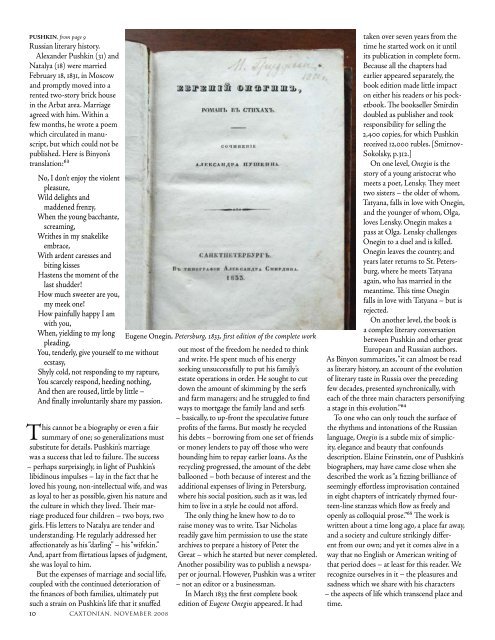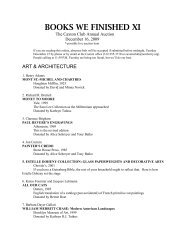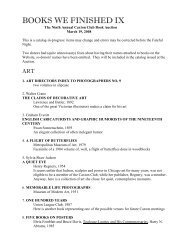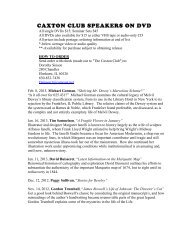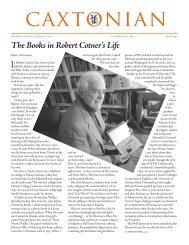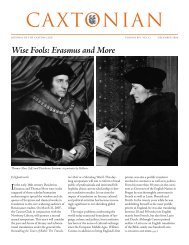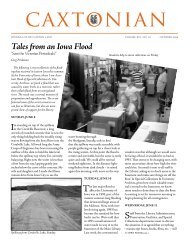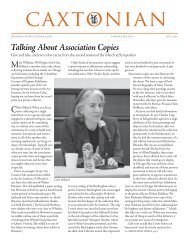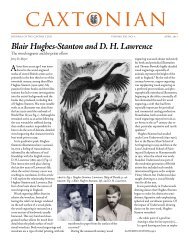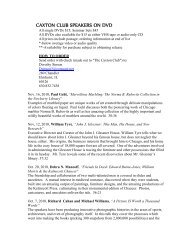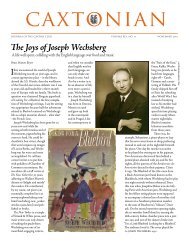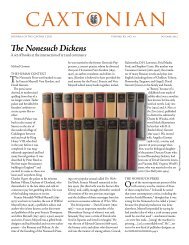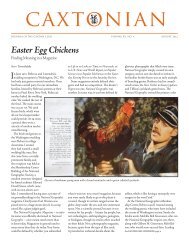Collecting Pushkin - The Caxton Club
Collecting Pushkin - The Caxton Club
Collecting Pushkin - The Caxton Club
Create successful ePaper yourself
Turn your PDF publications into a flip-book with our unique Google optimized e-Paper software.
PUSHKIN, from page 9<br />
Russian literary history.<br />
Alexander <strong>Pushkin</strong> (31) and<br />
Natalya (18) were married<br />
February 18, 1831, in Moscow<br />
and promptly moved into a<br />
rented two-story brick house<br />
in the Arbat area. Marriage<br />
agreed with him. Within a<br />
few months, he wrote a poem<br />
which circulated in manuscript,<br />
but which could not be<br />
published. Here is Binyon’s<br />
translation:63<br />
No, I don’t enjoy the violent<br />
pleasure,<br />
Wild delights and<br />
maddened frenzy,<br />
When the young bacchante,<br />
screaming,<br />
Writhes in my snakelike<br />
embrace,<br />
With ardent caresses and<br />
biting kisses<br />
Hastens the moment of the<br />
last shudder!<br />
How much sweeter are you,<br />
my meek one!<br />
How painfully happy I am<br />
with you,<br />
When, yielding to my long<br />
pleading,<br />
You, tenderly, give yourself to me without<br />
ecstasy,<br />
Shyly cold, not responding to my rapture,<br />
You scarcely respond, heeding nothing,<br />
And then are roused, little by little –<br />
And finally involuntarily share my passion.<br />
This cannot be a biography or even a fair<br />
summary of one; so generalizations must<br />
substitute for details. <strong>Pushkin</strong>’s marriage<br />
was a success that led to failure. <strong>The</strong> success<br />
– perhaps surprisingly, in light of <strong>Pushkin</strong>’s<br />
libidinous impulses – lay in the fact that he<br />
loved his young, non-intellectual wife, and was<br />
as loyal to her as possible, given his nature and<br />
the culture in which they lived. <strong>The</strong>ir marriage<br />
produced four children – two boys, two<br />
girls. His letters to Natalya are tender and<br />
understanding. He regularly addressed her<br />
affectionately as his “darling” – his “wifekin.”<br />
And, apart from flirtatious lapses of judgment,<br />
she was loyal to him.<br />
But the expenses of marriage and social life,<br />
coupled with the continued deterioration of<br />
the finances of both families, ultimately put<br />
such a strain on <strong>Pushkin</strong>’s life that it snuffed<br />
10 CAXTONIAN, NOVEMBER 2008<br />
Eugene Onegin, Petersburg, 1833, first edition of the complete work<br />
out most of the freedom he needed to think<br />
and write. He spent much of his energy<br />
seeking unsuccessfully to put his family’s<br />
estate operations in order. He sought to cut<br />
down the amount of skimming by the serfs<br />
and farm managers; and he struggled to find<br />
ways to mortgage the family land and serfs<br />
– basically, to up-front the speculative future<br />
profits of the farms. But mostly he recycled<br />
his debts – borrowing from one set of friends<br />
or money lenders to pay off those who were<br />
hounding him to repay earlier loans. As the<br />
recycling progressed, the amount of the debt<br />
ballooned – both because of interest and the<br />
additional expenses of living in Petersburg,<br />
where his social position, such as it was, led<br />
him to live in a style he could not afford.<br />
<strong>The</strong> only thing he knew how to do to<br />
raise money was to write. Tsar Nicholas<br />
readily gave him permission to use the state<br />
archives to prepare a history of Peter the<br />
Great – which he started but never completed.<br />
Another possibility was to publish a newspaper<br />
or journal. However, <strong>Pushkin</strong> was a writer<br />
– not an editor or a businessman.<br />
In March 1833 the first complete book<br />
edition of Eugene Onegin appeared. It had<br />
taken over seven years from the<br />
time he started work on it until<br />
its publication in complete form.<br />
Because all the chapters had<br />
earlier appeared separately, the<br />
book edition made little impact<br />
on either his readers or his pocketbook.<br />
<strong>The</strong> bookseller Smirdin<br />
doubled as publisher and took<br />
responsibility for selling the<br />
2,400 copies, for which <strong>Pushkin</strong><br />
received 12,000 rubles. [Smirnov-<br />
Sokolsky, p.312.]<br />
On one level, Onegin is the<br />
story of a young aristocrat who<br />
meets a poet, Lensky. <strong>The</strong>y meet<br />
two sisters – the older of whom,<br />
Tatyana, falls in love with Onegin,<br />
and the younger of whom, Olga,<br />
loves Lensky. Onegin makes a<br />
pass at Olga. Lensky challenges<br />
Onegin to a duel and is killed.<br />
Onegin leaves the country, and<br />
years later returns to St. Petersburg,<br />
where he meets Tatyana<br />
again, who has married in the<br />
meantime. This time Onegin<br />
falls in love with Tatyana – but is<br />
rejected.<br />
On another level, the book is<br />
a complex literary conversation<br />
between <strong>Pushkin</strong> and other great<br />
European and Russian authors.<br />
As Binyon summarizes, “it can almost be read<br />
as literary history, an account of the evolution<br />
of literary taste in Russia over the preceding<br />
few decades, presented synchronically, with<br />
each of the three main characters personifying<br />
a stage in this evolution.”64<br />
To one who can only touch the surface of<br />
the rhythms and intonations of the Russian<br />
language, Onegin is a subtle mix of simplicity,<br />
elegance and beauty that confounds<br />
description. Elaine Feinstein, one of <strong>Pushkin</strong>’s<br />
biographers, may have came close when she<br />
described the work as “a fizzing brilliance of<br />
seemingly effortless improvisation contained<br />
in eight chapters of intricately rhymed fourteen-line<br />
stanzas which flow as freely and<br />
openly as colloquial prose.”65 <strong>The</strong> work is<br />
written about a time long ago, a place far away,<br />
and a society and culture strikingly different<br />
from our own; and yet it comes alive in a<br />
way that no English or American writing of<br />
that period does – at least for this reader. We<br />
recognize ourselves in it – the pleasures and<br />
sadness which we share with his characters<br />
– the aspects of life which transcend place and<br />
time.


